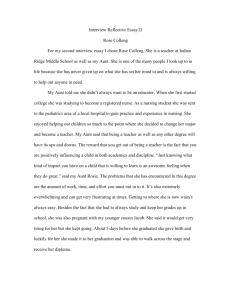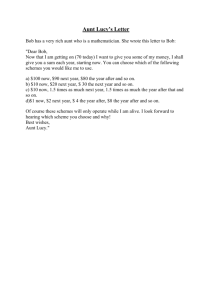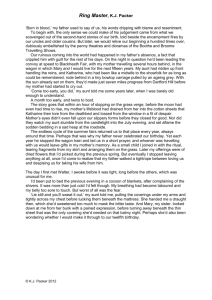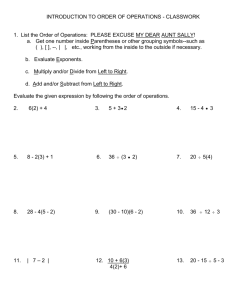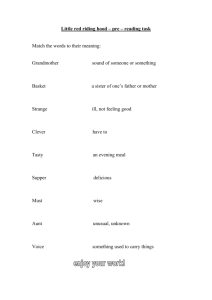Literature Circle Guide to Fair Weather by Richard Peck
advertisement
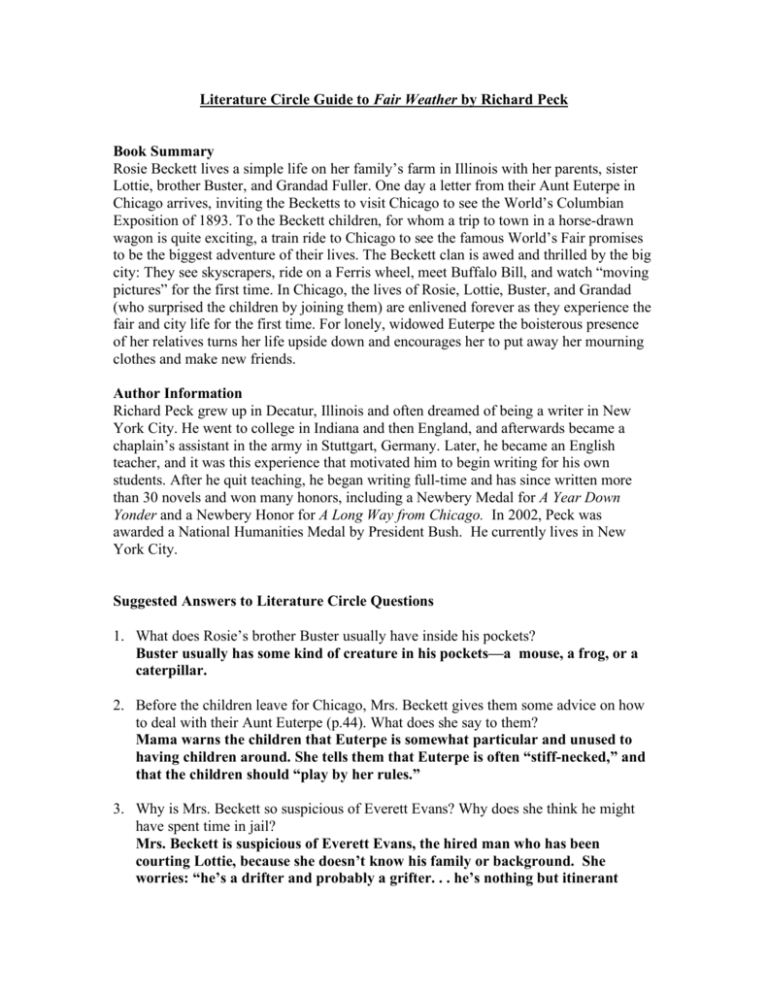
Literature Circle Guide to Fair Weather by Richard Peck Book Summary Rosie Beckett lives a simple life on her family’s farm in Illinois with her parents, sister Lottie, brother Buster, and Grandad Fuller. One day a letter from their Aunt Euterpe in Chicago arrives, inviting the Becketts to visit Chicago to see the World’s Columbian Exposition of 1893. To the Beckett children, for whom a trip to town in a horse-drawn wagon is quite exciting, a train ride to Chicago to see the famous World’s Fair promises to be the biggest adventure of their lives. The Beckett clan is awed and thrilled by the big city: They see skyscrapers, ride on a Ferris wheel, meet Buffalo Bill, and watch “moving pictures” for the first time. In Chicago, the lives of Rosie, Lottie, Buster, and Grandad (who surprised the children by joining them) are enlivened forever as they experience the fair and city life for the first time. For lonely, widowed Euterpe the boisterous presence of her relatives turns her life upside down and encourages her to put away her mourning clothes and make new friends. Author Information Richard Peck grew up in Decatur, Illinois and often dreamed of being a writer in New York City. He went to college in Indiana and then England, and afterwards became a chaplain’s assistant in the army in Stuttgart, Germany. Later, he became an English teacher, and it was this experience that motivated him to begin writing for his own students. After he quit teaching, he began writing full-time and has since written more than 30 novels and won many honors, including a Newbery Medal for A Year Down Yonder and a Newbery Honor for A Long Way from Chicago. In 2002, Peck was awarded a National Humanities Medal by President Bush. He currently lives in New York City. Suggested Answers to Literature Circle Questions 1. What does Rosie’s brother Buster usually have inside his pockets? Buster usually has some kind of creature in his pockets—a mouse, a frog, or a caterpillar. 2. Before the children leave for Chicago, Mrs. Beckett gives them some advice on how to deal with their Aunt Euterpe (p.44). What does she say to them? Mama warns the children that Euterpe is somewhat particular and unused to having children around. She tells them that Euterpe is often “stiff-necked,” and that the children should “play by her rules.” 3. Why is Mrs. Beckett so suspicious of Everett Evans? Why does she think he might have spent time in jail? Mrs. Beckett is suspicious of Everett Evans, the hired man who has been courting Lottie, because she doesn’t know his family or background. She worries: “he’s a drifter and probably a grifter. . . he’s nothing but itinerant labor” (p. 6). She even thinks he might have spent time in jail, because when they first met him he was so “pale and spindly” like he had been cooped up for a long, long time (p. 41). 4. On the second day her relatives are visiting, what happens to Aunt Euterpe to make that the worst day in her whole life? Euterpe’s cook/housekeeper and maid both quit after Lottie and Rosie accidentally usurp their roles by cleaning the kitchen and making breakfast for the family. Then while Euterpe, Rosie, and Lottie are lunching at the elegant Turkish pavilion, Euterpe’s idol Mrs. Potter Palmer appears, and Rosie humiliates her aunt by chatting incessantly with Mrs. Palmer. 5. In three or four sentences, describe life on the Becketts’ farm. What role does each family member play? The Becketts are poor but hard-working. Mama and Dad work from morning till night with little time for distraction. Lottie and Rosie have the jobs of gathering eggs and making butter to sell in town. Buster is often up to mischief and usually finds a way to escape working with his father in the fields. Grandad drives into town every day to deliver the eggs and butter, do the shopping, and fetch the mail (which rarely comes.) 6. The Beckett children are surprised to learn that their Grandad is an old friend of Buffalo Bill. How do these two know each other? Grandad and Buffalo Bill are war buddies; both fought in the Battle of Tupelo in the Civil War. 7. If you had been able to attend the 1893 World’s Fair in Chicago, what sight, event, or famous person would have been most interesting to you? Explain why. Students’ answers will vary. Students will note that many modern amenities we still use today were introduced at the 1893 World’s Fair. 8. What important role does Tip the dog play in this story? Through Tip, the Becketts, Grandad, and Aunt Euterpe are introduced to some of the most famous people in attendance at the 1893 World’s Fair. While watching the performance of Buffalo Bill and his Rough Riders, Tip became so excited that he jumped from the bleachers into the performance. His antics entertained the crowd, and as a result, the Beckett children, Aunt Euterpe, and Grandad got to meet the famous Buffalo Bill, as well as the mayor of Chicago, after the performance. Buffalo Bill invited the Becketts and Euterpe to sit in his own box, where they also got to meet Lillian Russell, the famous movie actress. 9. Rosie realizes that her aunt is terribly lonely: “I’d had to come to this city jammed with people to see a soul as lonely as hers” (p. 80). Why is Aunt Euterpe so lonely? Aunt Euterpe had been the secretary of the elderly Mr. Fleishacker, and when they married, they were the topic of much gossip. The friends of the first Mrs. Fleishacker shunned Euterpe publicly, cutting her off from Chicago society. When Mr. Fleishacker died, Euterpe was left alone, without friends or connections in the city. 10. When Rosie addresses postcards to her parents, she writes “Mr. and Mrs. Gideon Beckett, Rural Christian County, Illinois.” What seems unusual about her parents’ address, and what does their address show us about the place Rosie is from? Students will notice that the Becketts’ address doesn’t have a street name or number or a zip code. Because Rosie’s parents live in a very rural area that is sparsely populated, their address includes just the name of the county. And because mail isn’t delivered directly to their home, but rather picked up by Grandad in town, the address does not need to be more precise. 11. Who is Mrs. Potter Palmer, and why is Aunt Euterpe so intimidated by her? Mrs. Potter Palmer is the “queen of Chicago society.” According to Aunt Euterpe, there are no locks or knobs on Mrs. Palmer’s outer doors; a visitor is admitted only by servants. Since her husband died, Euterpe has been shunned by Chicago society, and she lives a lonely, isolated life in her grand house. She longs to have friends and be accepted, and from afar she admires Mrs. Palmer and wishes to be included in her circle but has no idea how to make new friends. 12. After meeting Lillian Russell in the colonel’s box at the Buffalo Bill show, Rosie realizes that the musical star has something in common with her widowed aunt, despite their different lifestyles (p. 120). What do Lillian Russell and Aunt Euterpe have in common? Both women are outsiders to the high-society world around them, ignored and snubbed by others. Lillian Russell is shunned because she is an actress, a “loose woman” who paints her face and has already had three husbands. Aunt Euterpe is snubbed because she is the widow of a wealthy man who fell in love with her despite her poor background. 13. Grandad tells the children that he decided to join them on the trip to Chicago so that their mother wouldn’t worry about them. Do you think this is the truth? Why did Grandad really come? What do you think of his decision? Grandad had mixed motives, no doubt, for joining the children. He might have been concerned about their safety in Chicago. He might have wished to see his long-lost daughter Euterpe and her life as a wealthy woman. Most likely he was craving some adventure for himself, and desiring to see the great World’s Fair. Grandad’s decision does seem somewhat irresponsible and impulsive, since he didn’t tell anyone in advance about his plans. He also used the ticket that Euterpe sent for Mama, by secretly removing it from the envelope Mama gave him to mail to Chicago. 14. The novel begins, “It was the last day of our old lives, and we didn’t even know it” (p. 1). Explain in your own words what Rosie’s statement means. Can you think of a similar day in your own life? Before Aunt Euterpe’s invitation arrives, the Beckett family is living life as a simple country family. But with the arrival of Euterpe’s letter, adventure begins for all of them. No longer is the Becketts’ world limited to life on their farm, after they explore the big city and witness the fair. As a result of their visit to Chicago, Rosie becomes curious about the world and begins desiring an education, and Lottie’s relationship with Everett Evans is accepted by her family. 15. Rosie finds her future at the fair. What does she learn there about herself that she couldn’t have learned at home? Rosie learns that the world is bigger than she ever imagined, with more opportunities than she ever considered before. She becomes aware of the limitations of life on the farm, and realizes that she has much more to learn. At the fair she discovers many man-made marvels, as well as her own ability to interact with people from all social levels and backgrounds. Through her experiences at the fair, Rosie has become curious about the world around her, and as a result she yearns to learn and grow. Note: These literature circle questions are keyed to Bloom’s Taxonomy as follows: Knowledge: 1-3; Comprehension: 4-6; Application: 7; Analysis: 8-10; Synthesis: 11-12; Evaluation: 13-15. Activities 1. From the descriptions and photographs in the novel, create a bird’s-eye-view map of the Chicago World’s Fair. Label the important landmarks and features that Rosie saw. Through this activity, students will be able to visualize the setting of the novel. To create their maps, they will need to pay attention to descriptive passages and photographs in the novel. 2. Both Mrs. Beckett and Aunt Euterpe spend a great deal of effort making sure that Rosie, Buster, and Lottie are well-dressed for their Chicago visit. Draw each of these characters wearing one of their new outfits, according to descriptions in the novel. You may wish to use a dictionary or encyclopedia to help you picture the clothing that the children are wearing. With this activity, students have the opportunity to picture the main characters as their appearance changes when they don new fashionable clothes for their trip to the city. Students should be prepared to share their drawings with their classmates and discuss what it would be like to dress as the Beckett children in this novel. 3. Why do you think Aunt Euterpe invites her country relatives to visit her? Reread her letter to Mrs. Beckett on pages 12-15 for insight into Aunt Euterpe, and write a onepage journal entry from the point of view of Aunt Euterpe. Explain her reasons for inviting her long-lost relatives to Chicago as well as her misgivings about what she is doing. Aunt Euterpe feels a responsibility to introduce her sister’s children to the wider world, offering them the once-in-a-lifetime experience of seeing the 1893 World’s Fair. Also, though she lives in the midst of the great metropolis of Chicago, Euterpe lives a lonely life as a widow and could use some distraction and stimulation in her life. At the same time, Euterpe lacks experience with children and doesn’t really know her nieces and nephew at all, so she has no idea what is in store for her when her relatives visit.
